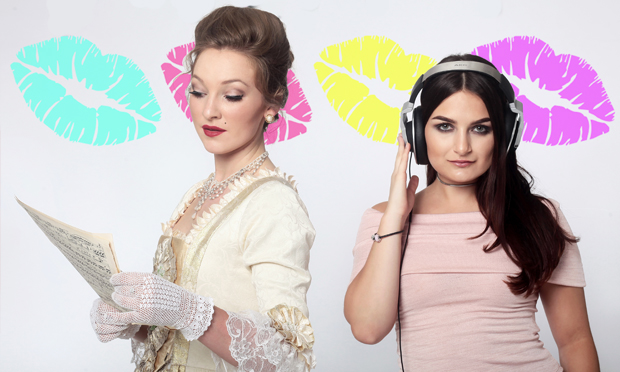Arcola, The Marriage of Kim K review: ‘it isn’t going to break the internet’

Yasemin Gulumser as Kim Kardashian in The Marriage of Kim K
72 days – the length of Kim Kardashian’s marriage to Kris Humphries, the New Jersey Nets’ star player. Like the reality TV star’s actual marriage, the Arcola’s operatic take on the episode, entitled The Marriage of Kim K, is brief at just 75 minutes.
The opera is being staged as the opener of the East London theatre’s Grimeborn season, billed as Dalston’s gritty response to the rarefied world of Glydebourne.
Leoe and Hyde’s opera attempts to retell the story of Kardashian’s failed marriage to Humphries whilst simultaneously rehashing Mozart’s The Marriage of Figaro and offering an insight into the lives of quarrelling a young couple, Amelia and Stephen. If that sounds like a bit of a mess, that’s because it is.
Stephen is an opera aficionado and aspiring writer whilst Amelia, his wife, is a lawyer and Kim Kardashian devotee. The young couple argue over how their evenings together should be spent – watching The Marriage of Figaro or Keeping Up with the Kardashians. Unable to decide, the young couple, played by real-life couple Amelia Gabriel and Stephen Hyde, flit between the two taking the audience with them.

“Hits the right notes”: Emily Burnett (left) delivers a strong performance as the Countess
Amelia and Stephen sit centre stage, flanked by the romping Kim (Yasemine Mireille) and Kris (James Edge) to one side, and Mozart’s Count Almaviva (Nathan Bellis) and the Countess (Emily Burnett) to the other. As Amelia enjoys scrolling through Kim K’s Instagram, which makes her feel less alone, Stephen listens gleefully to Mozart. Nathan Bellis and Emily Burnett perform powerfully in 18th century costume in Italian, and then in English translation when subtitles are turned on by Amelia.
Whilst Burnett and Bellis’ singing hits the right notes, their scenes are as tightly cut as a Keeping Up… episode, making it difficult to fit them into the original opera or to feel any real connection to this sub-plot.

Mozart’s opera was revolutionary because of his focus on the lives of comparatively normal people, where earlier opera had been based on myth and populated by heroes as the ruling class. The upper-classes of The Marriage of Figaro are lustful and degenerate – similarly, The Marriage of Kim Kardashian centres the production on a quarrelling twenty-something couple watching “trash” television; a brave and unique parallel to draw.
The realness of the couple’s relationship comes through in the comfortable way they share each other’s space. They refuse to leave the shared sofa. The couple are dealing with the depressingly familiar transition from a university relationship, where you spend all of your time together and can share in creative and intellectual adventures, to one as adults with mostly separate lives. They spend their days apart – both want their partner to share in their joy and drama that they care about, but refuse to acknowledge what each means to the other. This human connection and sensitivity is the saving grace of an otherwise distractingly noisy play.
This looks to be a promising company, with lots of ideas and an openness to the zeitgeist, but the production still has a lot of scope for more depth. Opening Grimeborn the day after record breaking ratings for the final of Love Island, its playful take on reality television and relationships is clearly pertinent. Whilst it isn’t going to break the internet, it’s an exciting starting point for a new generation of opera and theatre makers, and I look forward to seeing what else the Arcola season will bring.
